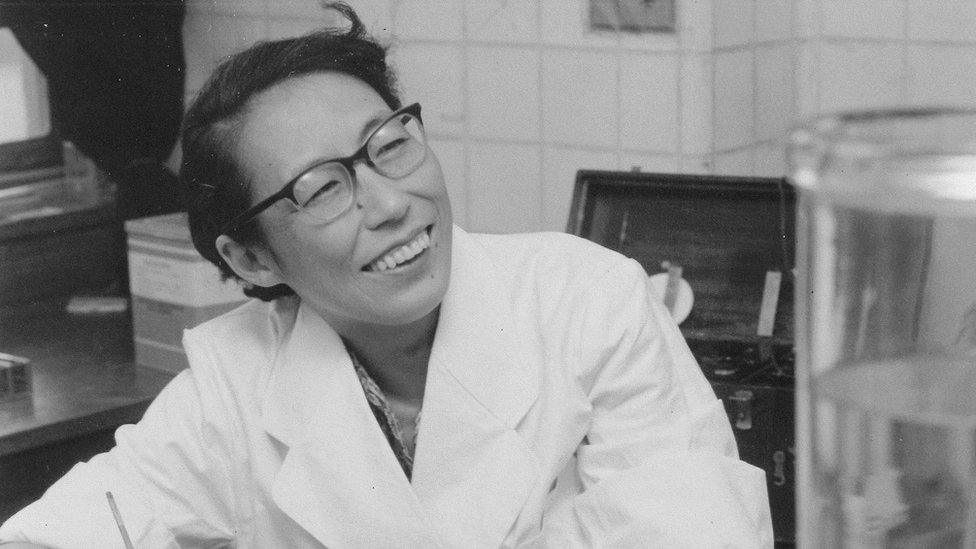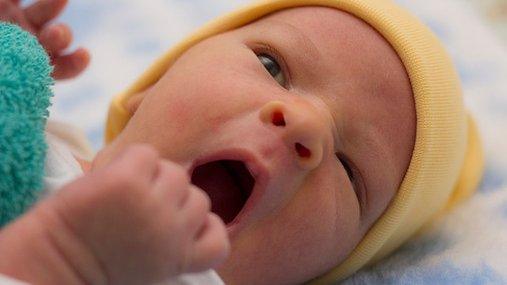Postpartum haemorrhage: Cheap lifesaver 'cuts deaths by a third'
- Published
- comments
Severe bleeding after childbirth is the leading cause of maternal death worldwide
A cheap drug has been shown to stop women bleeding to death, in a discovery that should change practice around the world, say researchers.
Every year, 100,000 women die from massive bleeding in the moments after giving birth.
But an international study, in the Lancet, external, suggests "tranexamic acid" could cut that by a third.
Postpartum haemorrhage is the biggest cause of death during pregnancy and early motherhood.
"They gave me 41 bottles of blood," said Nosheen, from Rawalpindi, in Pakistan who nearly died after the birth of her daughter.
Nosheen's life was saved only by an emergency hysterectomy.
She told the BBC World Service's Health Check programme: "Doctors told me that they will have to remove my uterus to save my life.
"My health is completely destroyed, and I am very upset about it."
Tranexamic acid might have helped Nosheen.
It stops blood clots breaking down to make it easier for the body to stem bleeding.
It was invented by husband and wife Shosuke and Utako Okamoto in Japan in the 1960s.

Utako Okamoto in her lab in 1961
But they could not convince local doctors to perform a clinical trial for postpartum haemorrhage.
So instead it was picked up by a pharmaceutical company and used as a treatment for heavy periods.
And there the story nearly ended.
Eventually, a study was coordinated by the London School of Hygiene and Tropical Medicine in a collaboration of 193 hospitals mostly in Africa and Asia.
Prof Utako Okamoto died, aged 98, just after the 20,000th and final patient was enrolled on to the trial that would finally prove she had been right.
Lifesaving
It found tranexamic acid cut deaths by a fifth overall and by 31% in those given the drug within three hours of birth.
Prof Ian Roberts, one of the researchers, told the BBC: "We've got an important result.
"We found an inexpensive drug, given in a single shot, that reduces the risk of bleeding to death, and it should play a role in reducing maternal mortality around the world."
The World Health Organization said it would update its recommendations for treating postpartum haemorrhage treatment.
The findings would not have been a surprise to Utako.
The UK team went to visit the "physically small, but so switched-on firecracker" near the start of the trial.
Her husband had already died.
In a film they made, she told them: "It's going to be good, it's going to be effective.
"Without doing the research, I know it will be effective."
In the poverty of post-War Japan, she and her husband decided to start researching blood because they could donate their own samples to study.
"We wanted to work on something international, we wanted to discover new drugs to show our gratitude to humanity," she said.
"We thought that would be wonderful."
Prof Roberts says he was blown away and inspired by her and this is not the end of the journey.
The drug might be cheap, but getting it into hospitals around the world will still be a challenge.
Prof Roberts added: "It is an awful thing for a mother to die in childbirth.
"When we started the trial, the staff would cry hearing about babies left without their mothers.
"Making sure the treatment is available everywhere it can save a life is hugely important.
"We shouldn't have children growing up without a mother for lack of a drug that costs a dollar."
Dr Rizwana Chaudri, from Rawalpindi Medical College, said: "Women dying of postpartum haemorrhage, women brought dead to the hospital, there's so many of them.
"You can't even think of that in a developed world, but over here this is a daily thing that goes on and on and on."
Follow James on Twitter., external
- Published7 October 2014
- Published3 December 2014
